Review:The baptism of the Holy Spirit (Go straight or go by upside-down)
Paul started his another missionary journey immediately after returning to the Antioch Church from his second missionary journey, focusing on evangelism in Asia province where he could not have entered during his last missionary journey. (Acts 18:23)
An appropriate statement and an upside-down statement
Once upon a time, a monk asked YunMen WenYan (864-949) "What are the teachings of Buddha's whole lifetime? "
YunMen is known to have lived at Yunmen monastery on Mount Yunmen in Shao district of Guangdong Province and to have established one of major sects of the Zen Buddhism called Yunmen School during the later period of the Tang Dynasty and the five dynasties and ten kingdoms period (907-960) in China,
Buddha is said to have preached often using expedients depending on the occasion of each preach and the capacity of each people and comforted people all over India for about forty years after he had attained enlightenment under the Bodhi tree. If one tries to explain whole of his teaching, he has to make clear a huge volume of Tripitaka (Three Canons of Buddha's teaching) that consists of Sutta(Teaching)-pitaka, Abhidhamma(Treatises)-pitaka and Vinaya(Monastic rules)-pitaka.
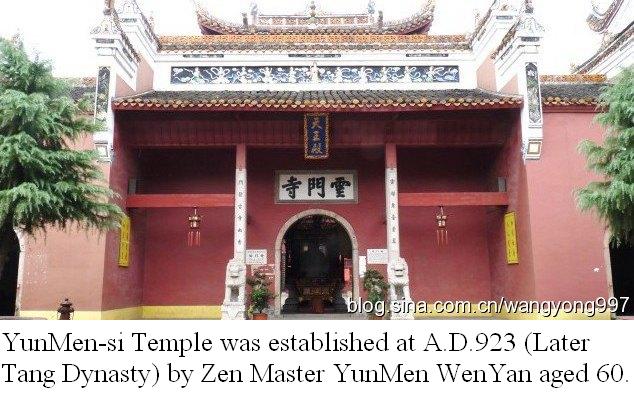
By the way each school of Zen Buddhism has distinctive pedagogical methods or formulas, such as Linji school's "Four Shouts" and "Five ranks of the absolute and the relative (wu-wei pian-zheng)" developed by the Cao-Dong (Soto) school. And as usual, within one sentence of YunMen, three sentences are bound to be present. These are called the sentence that encloses heaven and earth, the sentence that follows the waves, and the sentence that cuts off the myriad streams. His pedagogical method is naturally extraordinary. He clutches a student who meets him together with heaven and earth at once and then shears myriad streams of his earthly desires just like cut-ting nails and let him go.
This time, YunMen, who was asked what was whole teaching of the Buddha by a monk, did not explain the whole great treasure house of Buddha's teachings through three pitakas, but just answered, "An appropriate statement (Go straight)."
However, this monk seems to have been unsatisfied with the answer and on the other day he asked YunMen again, "When it's not the present intellect and it's not the present phenomena, what is it?" Then, YunMen said, "An upside-down statement (Then, go by upside-down)."
Paul starts his third missionary Journey
Paul started his another missionary journey immediately after returning to the Antioch Church from his second missionary journey, focusing on evangelism in Asia province where he could not have entered during his last missionary journey. (Acts 18:23)
Paul dared to carry out missionary work in Asia province though he had been kept by the Holy Spirit from preaching the word in that province. His such decisive action seems to have resulted in not only worsening the relationship between Paul and the Jerusalem church but also deepening the difference between Paul and some members of the Antioch Church, such as Barnabas.
Paul had left Aquila, a tentmaker from Pontus, whom he had met in Corinth, and his wife Priscilla in Ephesus on the way back from his second missionary journey. (Acts 18:19) He seems to already have had the indomitable resolve to come back to the province of Asia at that time.
By the way, the author of the Acts of the Apostles has changed the order of the names of "Aquila and his wife Priscilla" into "Priscilla and Aquila" since the second mentioning of the couple to make it clear which of them played the important role on helping Paul's missionary work.
Apollos and his 12 disciples
While Paul still traveled from place to place throughout the region of Galatia and Phrygia, a Jew named Apollos, a native of Alexandria, came to Ephesus. He was a learned man, with a thorough knowledge of the Scriptures. He spoke boldly and with great fervor and taught about Jesus accurately in the synagogue, though he knew only the baptism of John. When Priscilla and Aquila heard him, they invited him to their home and explained to him the way of God more adequately. When Apollos wanted to go to Achaia, the brothers encouraged him and wrote to the disciples there to welcome him. On arriving in Achaia, he vigorously refuted the Jews in public debate, proving from the Scriptures that Jesus was the Christ. (Acts 18:24-28)
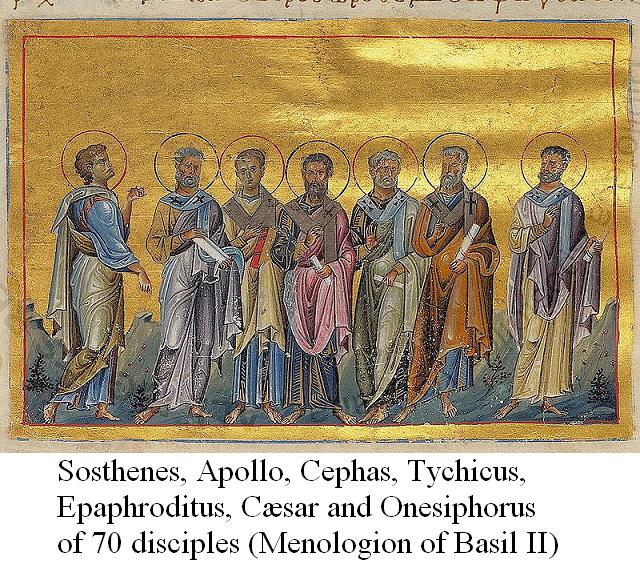
While Apollos was at Corinth, Paul took the road through the interior and arrived at Ephesus. There he found some disciples and asked them, "Were you baptized with the Holy Spirit?" They answered, "No, we have not even heard that there is a Holy Spirit." So Paul asked, "Then what baptism did you receive?" "John's baptism," they replied. Then Paul explained, "John's baptism was a baptism of repentance in order to prepare the way for the Lord Jesus. The baptism with the Holy Spirit is the ultimate salvation and the essence of Jesus' teaching." The Acts of the Apostles does not specifically mention whose disciples these men were. However, from the context, they seem to have been the followers of Apollos. The Acts adds, "There were about twelve men in all." (Acts 19:1-7) Thus it implies that there were different versions of the story of "The Twelve Apostles." The name Jesus is nothing other than the Greek translation of Joshua, who led the Israelites against Canaan, and means 'Jah is redemption.' Therefore, there seems to have appeared men called Jesus, who claimed to be the savior, not only in Israel but also in other Mediterranean region.
I planted, Apollos watered
By the way, this Apollos, who is mentioned by the Acts of the Apostles, and Apollonius, a Greek Neopythagorean philosopher, who was born in the town of Tyana in Asia Minor and educated at Tarsos, the home town of Paul, seem to have been the same person. And the latter is said to have travelled to India later and studied Indian philosophy.
According to the Pauline Epistles, after Apollos went to Achaia, the Jerusalem church too dispatched their Missionary. Then factional activities occurred in the Corinthian Church in Achaia, as factions of Apollos, Paul, Peter and Christ. (1 Corinthian 1:11-13/3:4)
In the First Epistle to the Corinthians, which is said to have been written by Paul in Ephesus during his third missionary journey, Paul says, "What, after all, is Apollos? And what is Paul? Only servants, through whom you came to believe — as the Lord has assigned to each his task. I planted the seed, Apollos watered it, but God has been making it grow. So neither he who plants nor he who waters is anything, but only God, who makes things grow. The man who plants and the man who waters have one purpose, and each will be rewarded according to his own labor." (1 Corinthian 3:5-8) As it means that it depends on you to decide which way to choose, the way of Paul, Apollos, Christ or Muhammad. However, there's really only one thing that matters - being baptized with the Holy Spirit and returning to God. You may go straight the way of Paul, that is, 'an appropriate statement.' But you may also go by upside-down, that is, 'an upside-down statement.'
However, Paul violently condemned not only the Jerusalem church, which forced Gentiles to be circumcised, but also the faction of Apollos which had a Gnostic Background. As a result, Paul seems to have encountered opposition from both sides and to have been isolated.
Paul touched Dragon's Reverse Scale
The Chinese dragons do contain a rough spot, a Reverse Scale below their chins, that when touched, causes them to rage and destroy anything with their rampaging power. (TYPE-MOON Wiki - Wikia)
According to the Acts of the Apostles, Paul stayed and preached in Ephesus for two years, so that all the Jews and Greeks who lived in the province of Asia heard the word of the Lord. (Acts 19:10)
As it means that Paul seems to have preached the way of Jesus which makes one right with God through faith but not by Mosaic law (Roma 3:28) not only to Gentiles who spoke Greek and had not been circumcised but also to the Jews who had been circumcised.
Such conduct by Paul must have been perceived as a departure from the agreement of the First Apostolic Conference not only by the members of the Synagogue of the Freedmen (as it was called) -Jews but also by the mainstream of Jerusalem Church and the House of Hanan (the clan of the High Priest Caiaphas and his father in law Annas).
The Synagogue of the Freedmen-Jews
According to Mr. Shlomo Sand, Professor of history at Tel Aviv University, the Jewish population in Palestine was only about 800 thousand in the 1st century. In contrast, the Jewish population in the world was about 4 million. At its high point there, Judaism was professed by 7 to 8 percent of all the Roman empire's inhabitants. And those who served as the vanguard to increase the Gentile Judaists explosively seem to have been nothing other than the members of the Synagogue of the Freedmen-Jews of Cyrene and Alexandria as well as the provinces of Cilicia and Asia.
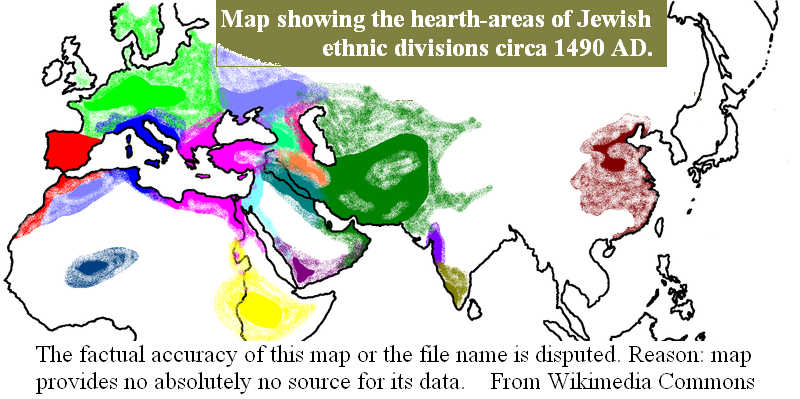
The tidal wave of church movement, which had occurred in the Mediterranean coast and finally reached Jerusalem, the headquarters of Judaism, was also originally derived from the Synagogue of the Freedmen-Jews. In other words without contribution of the Synagogue of the Freedmen-Jews, both Christianity and Islam would not have been born, Zen Buddhism also might not have blossomed in China and Japan and the birth of Modern Israel too would not have realized.
Gentiles of North Africa, who had been circumcised and converted to Judaism by their missionary work, are said to have moved into the Iberian Peninsula and formed Sephardic (Spaniards) Jews, one of three major Jewish ethnic divisions. The people of Khazars, who had originally lived in the Northern Caucasus and had mass-converted to Judaism in the 8th century, are said to have fled into Europe during the Mongol invasion and formed Ashkenazi (Germanic) Jews, the other Jewish ethnic divisions. Then, the Gentile Judaists in the Middle East and North Africa are said to have formed Mizrahi (Oriental) Jews, another Jewish ethnic divisions.
Hellenic believers, who had taken the lead in the Church Movement, forced to withdraw from the city of Jerusalem in the wake of the martyrdom of Stephen and founded a new Church in Antioch of Syria. However, the members of the Synagogue of the Freedmen-Jews remained in the city together with the mainstream of Jerusalem Church.
Therefore, the members of the Synagogue of the Freedmen-Jews seem to have been intimate not only with the House of Hanan, the clan of the high priest Caiaphas and his father in law Annas, but also with James the Less, who had served as the high priest for the Nazirites in the temple and had been appointed to the first bishop of the Jerusalem Church.
In contrast, Paul, who had served as a leader of the group martyred Stephen (Acts 7:58) and the chief executive officer executing the plan of habitat segregation for Hellenic believers and Hebraists (Acts 8:3), got a charter from the High Priest and went to Damascus of Syria and immediately participated in Hellenic believers' activities. Thus, the members of the Synagogue of the Freedmen-Jews tried to kill him as a traitor.
Freedmen built a financial district in London in the 1st C. AD
According to the recent report of National Geographic, a large number of ancient Roman writing tablets of the first century A.D. unearthed during the construction of the new European headquarters for Bloomberg LP in the City of London, including an old promissory note, on which is written "I, Tibullus, the freedman of Venustus have written and say that I owe Gratus, the freedman of Spurius, 105 denarii from the price of merchandise which has been sold and delivered …" And another tablet is a contract dated October 22, A.D. 62, and concerns the transport of 20 loads of provisions from Verulamium (present-day St. Albans) to London.
According to Roger Tomlin, a retired Oxford University classics scholar who deciphered and translated the tablets, the date of the contract is just after the Boudican (the Celtic queen who rebelled against the Roman Empire) revolt under which both London and St. Albans were destroyed at a cost of 70,000 lives.
Though it is a surprise that the business to transport of 20 loads of provisions revived soon from the ruins, much more interesting thing is that the businessmen who called themselves freedmen were doing such business. Who on earth were the freedmen doing business standing between the Romans and the Celts in the frontier land where the domination of Rome was still very fragile. Did the members of the Synagogue of the Freedmen-Jews move from North Africa into not only the Iberian Peninsula but also British Isles and even build a financial district in London as early as the firat century A.D.?
According to Wikipedia, the Roman nobles and the emperors seem to have been eager to emancipate slaves in order to increase their clientes or to give incentives to their servants who managed their farms, other businesses or properties. However, the slaves engaged to physical labor was rare to be emancipated. In other words, the freedmen were talented elite class at that time and could even get Roman citizenship.
The Riot in Ephesus
Paul, who had almost completed his initial purpose to evangelize in the province of Asia, decided to go to Jerusalem, passing through Macedonia and Achaia, and then to visit Rome, too. He sent two of his helpers, Timothy and Erastus, to Macedonia, while he stayed in the province of Asia a little longer. (Acts 19:21-22)
About that time there arose a great disturbance about the Way. A silversmith named Demetrius, who made silver shrines of Artemis, called the craftsmen under him and the workmen in related trades and said: "You see and hear how this fellow Paul has convinced and led astray large numbers of people here in Ephesus and in practically the whole province of Asia. He says that man-made gods are no gods at all. There is danger not only that our trade will lose its good name, but also that the temple of the great goddess Artemis will be discredited." When they heard this, the whole city was in an uproar. The people seized Gaius and Aristarchus, Paul's traveling companions from Macedonia, and rushed as one man into the theater and denounced them together with some other Jews.
Paul wanted to appear before the crowd, but the disciples would not let him. Even some of the officials of the province, friends of Paul, sent him a message begging him not to venture into the theater.
Then the city clerk quieted the crowd and said: "If, Demetrius and his fellow craftsmen have a grievance against anybody, the courts are open and there are proconsuls. They can press charges. If there is anything further you want to bring up, it must be settled in a legal assembly. As it is, we are in danger of being charged with rioting because of what happened today. In that case we would not be able to account for this commotion, since there is no reason for it." After he had said this, he dismissed the assembly. (Acts 19:21-41)
Paul perceived Jews' plot against him
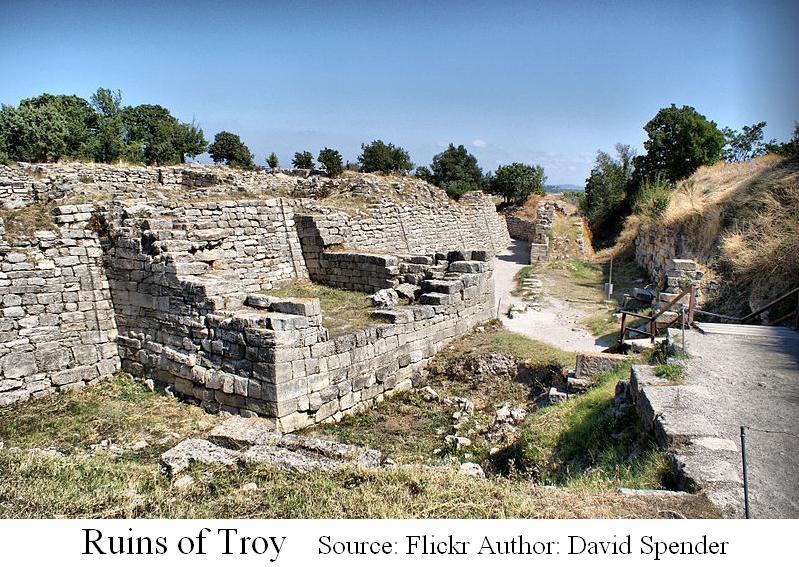
When the uproar had ended, Paul set out for Macedonia. He traveled through that area and finally arrived in Corinth, where he stayed three months. Because the Jews made a plot against him just as he was about to sail for Syria, he went back through Macedonia and sailed from Philippi with Luke, the author of the Acts of the Apostles, and arrived at Troas, a port city at the west edge of Anatolian peninsula. They joined an entourage team consisted of Sopater son of Pyrrhus from Berea, Aristarchus and Secundus from Thessalonica, Gaius from Derbe, Timothy also, and Tychicus and Trophimus from the province of Asia. These men had arrived at Troas ahead of them and had waited for them. They stayed in Troas seven days. (Acts 20:1-6) While staying in Troas, Paul and his followers broke bread and ate, just as Jesus and his 12 disciples at the Lsat Supper. (Acts 20:7/11) After the 7 days, the entourage team, including Luke, sailed for Assos, But Paul himself went there on foot. Then, they took Paul aboard and arrived at Miletus passing through Mitylene and Samos Island. (Acts 20:13-15)
The Acts of the Apostles does not mention specific contents of the plot of the Jews. However, Paul might have received a summon from the Jerusalem church or the high priest, regarding his missionary work in the province of Asia, which might have been perceived by them as a violation of the agreement of the First Apostolic Conference. And Paul might have perceived the risk put his live in jeopardy in the wake of changes in the situation occurred in Jerusalem. He also might have felt the risk to fall into helpless isolation in Jerusalem as it means that he could not expect supports not only from Peter and James the Less but also from Barnabas and Mark. That is why he returned to Macedonia to discuss the countermeasure with Luke. As a result, they organized a cheering squad consisting of representatives from churches around the region, including Luke from Macedonia, Sopater from Berea, Aristarchus and Secundus from Thessalonica, Gaius from Derbe, Timothy from Lystra and Tychicus and Trophimus from the province of Asia. Paul seems to have decided to go to Jerusalem together with them and to receive the interrogation.
Paul expressed his sorrow at parting
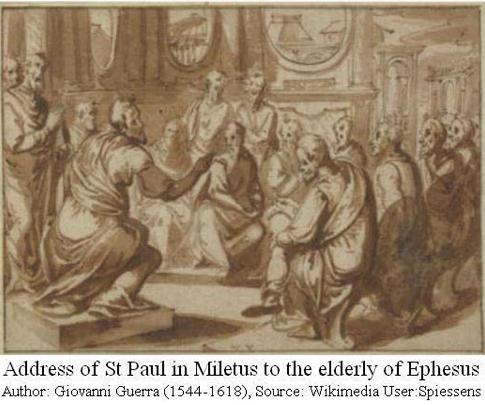
Paul had decided to sail past Ephesus to avoid spending time in the province of Asia, for he was in a hurry to reach Jerusalem, if possible, by the day of Pentecost. From Miletus, Paul sent to Ephesus for the elders of the church. (Acts 20:16-17) When they arrived, Paul told them his tragic resolution as if he went into the jaws of death. "Now, compelled by the Spirit, I am going to Jerusalem, not knowing what will happen to me there. I only know that in every city the Holy Spirit warns me that prison and hardships are facing me. However, I consider my life worth nothing to me, if only I may finish the race and complete the task the Lord Jesus has given me--the task of testifying to the gospel of God's grace. Now I know that none of you among whom I have gone about preaching the kingdom will ever see me again. Therefore, I declare to you today that I am innocent of the blood of all men. For I have not hesitated to proclaim to you the whole will of God. Keep watch over yourselves and all the flock of which the Holy Spirit has made you overseers. Be shepherds of the church of God, which he bought with his own blood." Furthermore, he said, "I know that after I leave, savage wolves will come in among you and will not spare the flock. Even from your own number men will arise and distort the truth in order to draw away disciples after them. So be on your guard! Remember that for three years I never stopped warning each of you night and day with tears." (Acts 20:18-31) He described missionaries, who would be dispatched by the Jerusalem Church after his departure as "savage wolves."
They all wept as they embraced him and kissed him. What grieved them most was his statement that they would never see his face again. Then they accompanied him to the ship. (Acts 20:37-38)
<To be continued>What is "Baptism with The Holy Spirit"?
According to the dialectic of the Gospel of John,
【Thesis】"A man can possess eternal life through accepting testimony of the Son of man and being baptized by him." (John 5:24)
【Anti-thesis】But "The one who comes from the earth cannot accept the testimony by one from heaven."(John 3:32)
How then can a man possess eternal life?
【Synthesis】"If you want to be baptized with the Holy Spirit, you can just go back to the word which was with God in the beginning (John 1:1) and certify that God is truthful. (John 3:33)"
When he said, "You are Huichao," Zen Master Fayan thrusted vivid Self in Huichao in front of his eyes.
Purchase here
[Reference]
《The Blue Cliff Record》Case 14: Yun Men's Appropriate Statement
A monk asked Yun Men, "What are the teachings of a whole lifetime? "
Yun Men said, "An appropriate statement."
《The Blue Cliff Record》Case 15: Yun Men's Upside-Down Statement
A monk asked Yun Men, "When it's not the present intellect and it's not the present phenomena, what is it?"
Yun Men said, "An upside-down statement."
Ancient Roman IOUs Found Beneath Bloomberg's New London HQ
英国最古の書字板発掘、二千年前の「日常」伝える
Voices from Roman London: The Story of The Bloomberg Writing Tablets
Your Comments / Unsubscribe
SEAnewsFacebook
SEAnewsGoogle
SEAnews eBookstore
SEAnews eBookstore(GoogleJ)